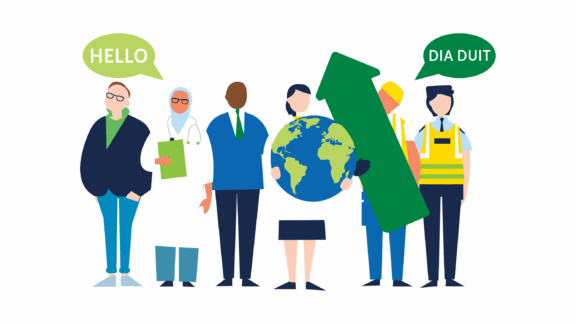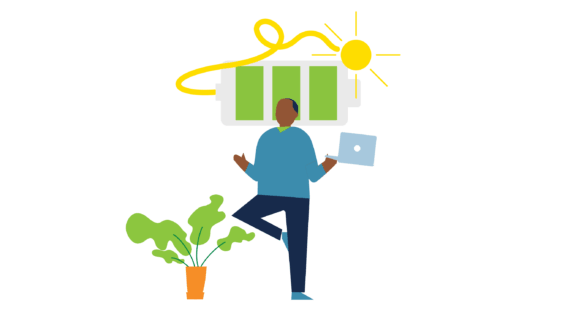Wellbeing at Work in 2025: What It Means for You
Workplace wellbeing is becoming a key priority for many organisations—perhaps you’ve already noticed? Employers in Ireland are starting to invest more resources to support workers and improve work-life quality. While promising, efforts vary in effectiveness and focus.
Experts agree that to truly enhance employee wellbeing, companies must go beyond offering perks like gym memberships or mindfulness apps. Addressing work-related factors—such as workload, job design, management practices, and workplace relationships—has a far greater impact. Recent studies emphasise this shift, highlighting the need to balance healthy workplace cultures with traditional health promotion programs.
What does this mean for you as an employee in 2025? Here are six workplace wellbeing trends to watch out for:
1. Preparing for AI and Advanced Technology
AI is increasingly becoming part of everyday work, with 75% of knowledge workers globally using it regularly. However, Ireland lags behind, with only 29% of professionals engaging with AI tools. 1 While exciting, this shift can bring uncertainty about job roles, security, and how AI will be integrated into teams.
For employees, this means opportunities for upskilling and adapting to new technologies. Many organisations are beginning to offer training to help workers navigate these changes. If you’re feeling apprehensive about AI, look for resources your employer might offer, such as digital training programs or assistance to navigate change. These supports could help you to stay competitive and boost your confidence in this new era at work.
2. Flexible Work Models Are Here to Stay
Even as some employers push for full-time office returns, remote and hybrid work remain popular. In Ireland, remote and hybrid job postings have increased by 17.5% compared to pre-pandemic levels.2 While flexibility offers greater autonomy and is vital for many demographics to participate in the workforce, especially parents and carers – long-term it can also bring challenges that indicate the need for best practice guidelines managing remote teams.
To make the most of hybrid work, prioritise communication with team members and seek opportunities to connect with colleagues in person. Flexibility can benefit both employees and employers when implemented thoughtfully.
3. Enhanced Mental Health Support
Stress, anxiety, and loneliness remain widespread issues, particularly among younger employees under 35. Recent surveys show that 41% of workers report high stress, and 20% feel lonely daily. 3 These challenges are driving companies to take mental health more seriously, with many introducing psychological health and safety assessments and better appraising specific role-related psychosocial risks.
For employees, this means growing access to better quality mental health resources. Keep an eye out for programs your workplace offers—whether that’s counselling, manager support training, or workshops for specific groups, such as parents or carers. Also advocating for these supports when needed can make a real difference in your work experience, for you and your colleagues – so speak up!
4. Increased Focus on Fostering Connection and Belonging
Strong and healthy workplace relationships at all tiers are essential for wellbeing. 4,5 However, microaggressions, subtle discrimination, and harassment persist in some organisations, particularly affecting marginalised groups.6 With Ireland’s workforce becoming increasingly multicultural, promoting inclusion is a growing focus.
Building better relationships at work starts with fostering psychological safety—the freedom to express ideas, feedback, or mistakes without fear of judgment. 7 Consider ways to improve communication and address conflicts constructively – if there is a need for supports to build skills in this area, bring it to the attention of management because a workplace where everyone feels valued and respected benefits everyone.
5. Evolution and Development of Holistic Wellbeing Programs
Beyond tackling work-related issues, many companies continue to offer health-focused initiatives, such as fitness challenges, nutrition programs, and stress management workshops. 8 These remain relevant, as chronic health issues, like obesity, persist across Ireland’s adult population. 9
You can play a role in shaping these programs by sharing your preferences and needs with your employer. Whether it’s financial wellbeing workshops to address cost-of-living pressures or support for life stages like menopause or parenthood, speaking up about your interest areas can ensure programs are better designed and more relevant to you and your colleagues.
6. Greater Transparency in Wellbeing Efforts
Finally, employers are increasingly being held accountable for their impact on worker wellbeing. Transparent reporting on employee health is becoming a more wide-spread expectation, which ties to sustainability goals (SDGs) and investor priorities.
Companies that measure and report on these efforts are more likely to create meaningful and lasting support systems for their employees. As such, participating openly and honestly in surveys and focus groups can support their endeavours. While it could feel invasive to disclose personal information to an employer, most often it is anonymous, complies with GDPR and can support them in more accurately assessing areas that need attention and resourcing more solutions accordingly.
Looking Ahead
Workplace wellbeing is evolving, and 2025 promises many new and emerging supports to assist employees to thrive at work.
By staying informed and engaging with your company’s initiatives, you can take full advantage of the resources available.
What wellbeing trends have you noticed in your workplace? Share your thoughts—your voice matters in shaping a healthier and more supportive work environment.
Written By:
Sarah Keane
References:
1. Microsoft. (2024). Microsoft Work Index 2024 – Ireland: Two thirds of workers in Ireland seek AI upskilling while changing employer climbs to highest level in three years.
2. Indeed. (2025). Jobs and hiring trends report. Retrieved from https://www.hiringlab.org/uk/blog/2025/01/28/indeed-2025-ireland-jobs-and-hiring-trends-report/
3. Gallup. (2024). State of the workplace 2024 report. Retrieved from https://www.gallup.com/workplace/349484/state-of-the-global-workplace.aspx
4. De Neve, J.-E., Kaats, M., & Ward, G. (2023). Workplace wellbeing and firm performance. Retrieved from https://doi.org/10.5287/ora-bpkbjayvk
5. Indeed. (2024). Indeed’s global work wellbeing report 2024. Retrieved from https://www.indeed.com/lead/indeeds-global-work-wellbeing-report-2024
6. CIPD. (2024). Good Work Index 2024. Retrieved from https://www.cipd.org/globalassets/media/knowledge/knowledge-hub/reports/2024-pdfs/8625-good-work-index-2024-survey-report-1-web.pdf
7. Edmondson, A. C. (2019). The fearless organization: Creating psychological safety in the workplace for learning, innovation, and growth. Wiley.
8. McKinsey & Company. (2025). Thriving workplaces: How employers can improve productivity and change lives. Retrieved from https://www.mckinsey.com/mhi/our-insights/thriving-workplaces-how-employers-can-improve-productivity-and-change-lives
9. Healthy Ireland. (2024). Healthy Ireland 2024 survey. Retrieved from https://www.gov.ie/en/publication/d1ab3-healthy-ireland-survey-2024/









